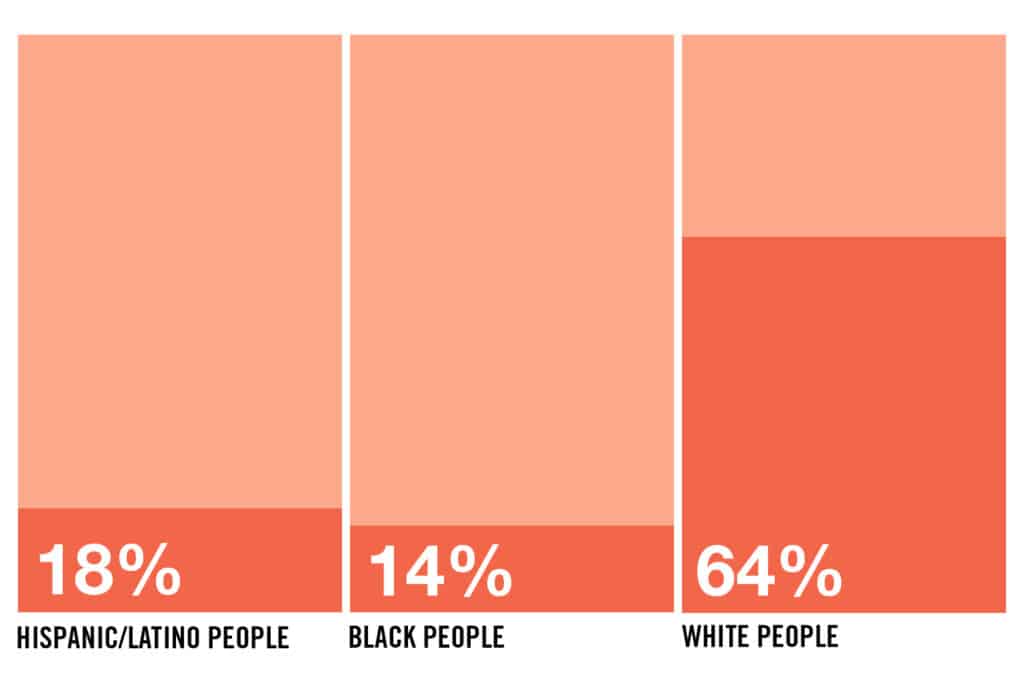The disparities in HIV prevention, testing, and care uptake in the United States is undeniable and demands a more compassionate, targeted response. Nowhere in the US is this more evident than in the US South, where over half of the nation’s new cases of HIV occur despite only comprising 38% of the population. This inequity is perpetuated by deep-seated stigma and discrimination that prevent many from accessing vital healthcare services. Stark disparities in the uptake of pre-exposure prophylaxis (PrEP) between Hispanic/Latino, Black, and White individuals further highlight the urgent need for fairer healthcare solutions.
PrEP use in the United States

Titan is a Black gay man who is living with HIV, an HIV advocate, and a member of the Collective for Community Action—a group of scholars and activists, who are committed to using their knowledge of the effects of trauma to create a lasting impact on communities. “I’m the ‘H’ in HIV – I’m human. I was diagnosed with AIDS and only had 4 T-cells, so I thought death was my diagnosis 19 years ago. Fast forward to now and I am in a position to make a change,” shared Titan.
By collaborating with people like Titan who have lived experience and a deep connection to their peers, the curriculum being developed by the University of Houston will have a community-centered approach at its core.
The importance of trauma-informed care in HIV treatment and prevention
Many people living with or who are at risk of HIV have experienced various forms of trauma, including physical and emotional abuse, discrimination, and stigma – including social stigma and self-stigma. Trauma-informed care is a vital approach to HIV prevention and treatment and by addressing a person’s experiences with a trauma-informed lens, we can significantly improve health outcomes.
Trauma-informed care is built on 6 principles:
- Safety
- Trustworthiness
- Peer support
- Collaboration
- Empowerment
- Cultural sensitivity
By integrating these principles into HIV care, healthcare providers can create an environment where people feel safe and supported. When individuals feel understood and respected, they are more likely to engage consistently in their treatment plans and communicate openly with their healthcare providers.
“We know HIV is not just a physical thing – it is a mental, emotional, and spiritual thing. I hold space for my clients to have real conversations to find out their needs so I can assist them on their journey. I didn’t have that when I was diagnosed. Picture me in an all-white doctor’s office and the doctor walks in and states you have AIDS then walks out. What do you do? Where do you go from here? We can help so many with trauma informed care being at the forefront of every interaction, empowering individuals mentally, emotionally and spiritually,” shared Titan.
Through our partnership with the University of Houston, we’re on a mission to normalize trauma-informed care so that we can effectively address the complex needs of people affected by HIV.
“I knew I had to do something for my community and for those individuals who are in need of care because the ‘safe spaces’ that currently exist aren’t always trauma-informed. You don’t know the trauma people have experienced just to get here, and simply by not being aware of this, your conversation could have deterred them from seeking care and support,” said Titan. “I think back to the one bad experience that made me stop going to the doctor, and I don’t want anyone else to experience the same.”
Leading with a community-centered approach
Working closely with individuals who have lived experiences with HIV and trauma allows for the creation of care models that are truly responsive to the needs of the community. This collaborative effort enhances the effectiveness of interventions in HIV care, helping to address the disparities that we are seeing such as in the uptake of PrEP.
Titan adds: “I want to make sure that the community that looks like me is represented in this space. I like to be the mental, emotional and spiritual support that you need when you’re diagnosed or returning to care – because I’m living it.”
Titan’s journey from an AIDS diagnosis and having only four T-cells to where he is today has empowered him to make a difference. “Your diagnosis is not a death sentence anymore, and I say, ‘You’re going to be okay, you’re going to breathe, and not are we going to talk about it. We are going to do something about it.’ I believe that if you can impact one person, you can change the future.”
Using trauma-informed care to break down stigma
Trauma-informed care plays a crucial role in reducing the stigma and discrimination often associated with HIV. Stigma can be a fundamental barrier in accessing HIV testing, prevention and treatment. A compassionate and non-judgmental environment helps mitigate the fear and shame many people experience, encouraging more individuals to seek care without the fear of being judged. This reduction in stigma not only improves mental health but also fosters a more inclusive and supportive healthcare system.
“At each organization, trauma-informed care needs to start in the parking lot from security to the front desk, to each and every touchpoint that person will make. People are scared to go anywhere that has anything to do with HIV because of all the stigma attached to it. It is up to us to eradicate that stigma by being trauma-informed,” explained Titan.
Learn more about our effort to break down barriers to care in the United States here.







